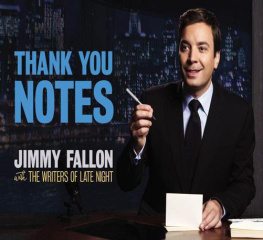ACKNOWLEDGMENTS
Id like to thank my amazing agent, Lorin Reese. Every time I told him the collection was finished, he would read it, then, in his no-nonsense Boston accent, tell me it was not finished, and I had better get back to work immediately. His suggestions made the stories infinitely stronger.
Thank you to my editor, Amy Einhorn, for being her legendary self, sharp-eyed, insightful, and kind. I wake up every day amazed and grateful to be working with her. Thank you, Marilyn Ducksworth, Stephanie Sorensen, Mih-Ho Cha, Kate Stark, and Michelle Malonzo for treating me like a superstar, and Ivan Held, Ellen Edwards, Halli Melnitsky, and everyone at Putnam and NAL for your enthusiasm. You have all made me feel that my stories are in the safest of hands.
Thanks to the people at literary magazines who printed my stories just when I started feeling like a lousy hack, especially Jenny Barber of Salamander, and Ashley Kaine, Betsy Beasley, and Robert Stewart of New Letters. And to my best writer/ reader friends, Jenny Moore and Olivia Boler, who scribbled things on my manuscript like Cmon, does this really happen on an army base?! Thank you to vastly talented authors Benjamin Percy and Jean Kwok, who are also generous with their time and knowledge.
Thank you to my family and friends, including my army family spread across the United States from Hawaii to New York. I cant imagine having made it through my husbands three long deployments without your wisdom and encouragement.
Id like to thank my husband, KC, who is my first and last reader, my military expert, fact-checker, harshest critic and most adoring fan, who continues to brave my moods and give me honest criticism, and who makes every single thing I write so much better than I could on my own.
And finally, I offer my unending gratitude to my parents, Bobbie and Eamon J. Fallon, who have always supported me. They taught me to chase my dreams, and I have, and its wonderful.
ABOUT THE AUTHOR
Siobhan Fallon lived at Fort Hood while her husband was deployed to Iraq for two tours of duty. She earned her MFA at the New School in New York City and lives with her family in the Middle East.
AUTHORS NOTE
An army base in a time of war is a very insular place. The guards at the entrance gates check the cars and drivers licenses of everyone trying to enter, often turning people away if they dont have a special visitors pass or military ID. And for those who live on base, they need never step foot into the civilian worldwe have our own child care, grocery stores, gas stations, movie theaters, bowling alleys, libraries, and gyms, the demarcation line between Fort Hood and the civilian world beyond ringed clearly with a chain-link fence topped with barbed wire.
We have our own rules, too: grass that must be mowed before it reaches a certain height, roads that shut down completely so soldiers can run their length during morning physical training, times when the entire post comes to a stop and stands at attention to listen to the evening bugle rendition of Retreat, parking spots for generals and sergeant majors or, more tragically, parking spots for families who have lost a soldier in combat.
In my stories, I tried to create a window into that world. I wanted to capture the moments that lead up to a deployment as well as those that follow a return. And I wanted to focus not only on the soldiers fighting on the front lines but also on the families that wait at home and try their best to stay intact, try their best to find everything they need within those guarded gates.
I began writing You Know When the Men Are Gone in Fort Hood, Texas, when my husband had just returned from his second deployment and was gearing up to deploy again. In 2006, soldiers deployed for a year or more, and spouses were grateful if their soldiers were home for an entire twelve months before heading back to the Middle East. So as much as I cherished having my husband safe and next to me, sharing a life together again, I was always aware of the fact that he was not going to be home for long.
These thoughts of a deployment color every aspect of a military spouses life. When we meet another spouse for the first time, we ask, How many times has your soldier deployed? It is a way to compare years of experience in a few short sentences. It is our way, without the obvious map of a soldiers uniform, to check out the medals on the other spouses chest, to know what she, too, has survived and what she is made of.
We make immediate friendships with other military spouses; we have no choice. The army usually moves a soldier and his family to a new base every six months to three years, depending on the soldiers job. This cycle of new neighborhoods, schools, zip codes, and time zones makes it hard for a spouse to work outside the home. We are far from our siblings and parents, cousins and childhood friends. The person we depend on the most in the world, the parent of our children, is suddenly seven thousand miles away and regularly getting shot at. So we create our own new and tenuous families with fellow spouses. The pizza play dates, informal coffees, and Family Readiness Group meetingsthe structure they lend to our days, and the feeling that we spouses are in this togetherhelp us get through the deployment.
While You Know When the Men Are Gone is a work of fiction, I hope that I was able to reflect the spectrum of the current army-family experience. There are so many more stories that I wished I had written; there are so many spouses who continue to inspire me with their constant support of their soldiers. They are independent, patient, fearless, remarkable men and women, and I am grateful to be a part of their community.
YOU KNOW WHEN THE MEN ARE GONE
In Fort Hood housing, like all army housing, you get used to hearing through the walls. You learn your neighbors routines: when and if they gargle and brush their teeth; how often they go to the bathroom or shower; whether they snore or cry themselves to sleep. You learn too much. And you learn to move quietly through your own small domain.
You also know when the men are gone. No more boots stomping above, no more football games turned up too high, and, best of all, no more front doors slamming before dawn as they trudge out for their early formation, sneakers on metal stairs, cars starting, shouts to the windows above to throw down their gloves on cold desert mornings. Babies still cry, telephones ring, Saturday morning cartoons screech, but without the men, there is a sense of muted silence, a sense of muted life.
At least things were muted until a new family moved into apartment 12A. Meg Brady from 11A could hear the rip and tear of boxes, chairs scraping against the floor, cabinets opening and closing, the weighed-down tread of the movers reminiscent of the soldiers far away.
Carla Wolenski from 6B knocked on Megs door around noon, slipping into Megs living room as soon as she cracked opened the door.
Natalya Torres is your new neighbor! Carla whispered, swinging her baby from one hip to the other. When Meg didnt show the enthusiasm or dread Carla expected, she held her baby close as if shielding it from the ignorance of the world. You havent heard anything about her?
Meg shook her head. Carla lifted tweezed eyebrows into small parentheses of dismay. She whacked the baby on the back, who promptly burped a milky chunk onto her shoulder. Trust me, youll hear it all soon enough, Carla said, flicking the spit-up onto Megs carpet. When Carla left, Meg followed her out onto the landing, ostensibly to walk her friend back to her own apartment, but she hesitated outside the Torreses open door, trying to see inside.













